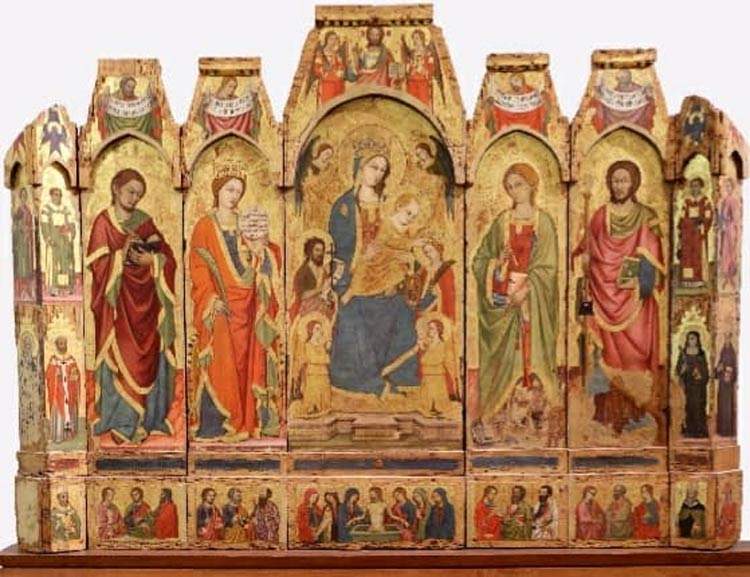Sicily, alderman praises a restoration done for free and hopes practice spreads: controversy ensues
It is (obviously) a controversy over the statements made by the Sicily Region’s Councillor for Cultural Heritage and Sicilian Identity, Alberto Samonà, who praised a restoration carried out for free by the professionals who took care of it, hoped that the practice of restoring works for free would spread, and then, after receiving so much criticism, changed his comment on social media. The restoration in question concerned one of the most important works of the Regional Museum “Agostino Pepoli” of Trapani, the polyptych made by the anonymous author traditionally identified as the Master of the Polyptych of Trapani, depicting a Madonna and Child crowning St. Catherine in the central compartment and four saints in the side compartments (Catherine, John, Margaret and James), and dating back to the early 15th century. The painting is considered a symbol of the Trapani museum.
The work has recently been relocated to the room of the Trapani picture gallery dedicated to late medieval painting, and the intervention was carried out by two professional restorers, Elena Vetere and Gaetano Alagna, under the supervision of the Trapani Superintendency, and with the support of the Amici del Museo Pepoli association.
An intervention, moreover, rather delicate: “The valuable painting,” explained Roberto Garufi, director of the Pepoli Museum, “presented in several points some lifting of the pictorial film and needed, therefore, a consolidation intervention able to ensure the correct adhesion of the layers of color and preparatory layer to the ancient wooden support. At the same time as the restoration, we carried out an intervention to adapt the exhibition space by creating the microclimatic conditions suitable for the good conservation of the work. In particular, in order to prevent potential damage caused by exposure to ultraviolet rays, we screened the openings of the exhibition hall by installing special filter panels.” And all this on one of the museum’s iconic works.
Councillor Samonà had posted a status on Facebook shortly after 1 p.m. with a statement of his own: “The restoration carried out on the polyptych of the Madonna of Trapani,” he had said, “is the result of work lent generously by the two restorers, to whom I express my personal thanks, and is an admirable example of how each of us can contribute with our own action to preserving collective memory. It is an example of good practice that I hope can spread more and more, and not only because the immensity of the Sicilian heritage requires inexhaustible resources that are not always available, but because generous gestures like this educate us to respect heritage and take care of it.” These were the phrases that generated controversy: many users wrote phrases such as “why don’t you work for free too?”, “I think that work implies a worthy remuneration whatever it is”, “professionalism should be paid”. Some even ironic: “kudos to billionaire restorers who may not live off their work at the expense of those who also work for a living.” Others wonder if tomorrow those who will pave Sicily’s roads will do so for free.
Very harsh comments also from the association Mi Riconosci? I am a cultural heritage professional, which states, “We believe that never, ever should a public administration make use of free labor. Never. But we understand that an administration that has no respect for labor wants to take advantage of it, and we also understand that for more or less noble reasons (certainly not shared by us) a firm wants to offer its services to the administration. But to go so far as to publicly call it GOOD PRACTICE to exploit other people’s labor for free is something.... We can’t find the words. You find them.”
Overwhelmed by the criticism, the alderman, in the evening (at 7:14 p.m. to be exact) deleted from his status (although they are still visible by going through the edit history. Perhaps, then, the controversy hit the nail on the head: work, especially if it requires highly specialized skills, must be paid for, and an alderman cannot wish away the practice of working for free.
 |
| Sicily, alderman praises a restoration done for free and hopes practice spreads: controversy ensues |
Warning: the translation into English of the original Italian article was created using automatic tools. We undertake to review all articles, but we do not guarantee the total absence of inaccuracies in the translation due to the program. You can find the original by clicking on the ITA button. If you find any mistake,please contact us.





























